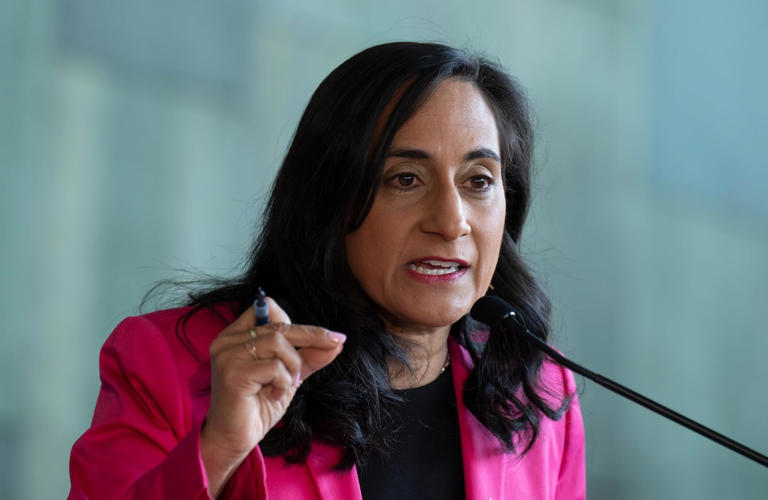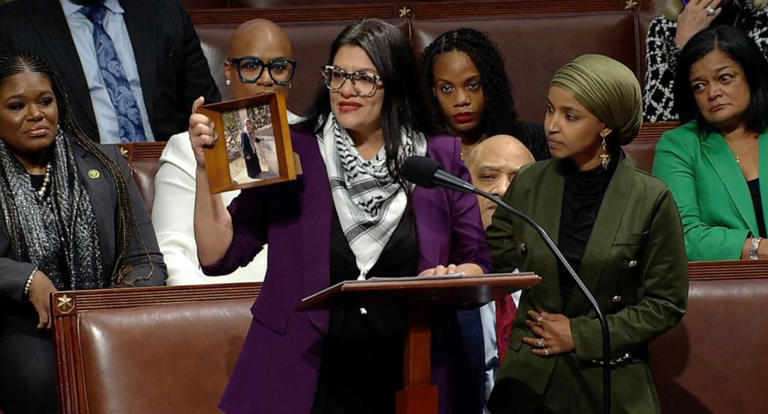
CALGARY — Alberta Premier Danielle Smith is set to share a stage in January with a right-wing news commentator who has defended a white-supremacist theory and spread misinformation about the war in Ukraine.
Tucker Carlson, who was fired by Fox News earlier this year, is scheduled to appear at a sit-down luncheon at the Telus Convention Centre in Calgary on Jan. 24.
An itinerary posted on Carlson's website said he will make remarks before being interviewed by a local businessman and having a conversation with Smith.
The premier's office confirmed Tuesday that Smith plans to attend Carlson's event in Calgary.
"The premier participates in a variety of public and private events and does interviews with dozens of reporters, broadcasters and podcasters from across the political spectrum," press secretary Sam Blackett said in an emailed statement.
"Obviously, she does not subscribe to every view of every interviewer or reporter she speaks with whether that's the CBC, the Toronto Star, or Tucker Carlson.
"The premier aims to share Alberta's message with as many people as possible whether they're from Alberta, Canada or around the world."
Opposition NDP Leader Rachel Notley said Carlson has attacked Ukraine, made disparaging remarks about women and endorsed an attempted uprising related to the presidential election in the United States.
"He is not a credible figure," Notley told reporters at an unrelated news conference in Edmonton.
"The fact that our premier believes it's appropriate to normalize the things this person would say by appearing on a stage with him demonstrates a profound lack of judgment on her part."
Notley said it also damages Alberta's reputation on an international level at a time when the province is trying to attract investment dollars.
"I would call on the premier to immediately cancel that planned appearance, because Albertans deserve better from their leadership," she said.
"They deserve responsibility. They deserve a measured form of leadership — and appearing with that character on stage is not that."
Smith doubled down on her office's statement when asked about the event during question period later Tuesday.
"We're talking about an individual who has the largest podcast audience probably in the world. That's an opportunity for us to tell Alberta's story," she said.
"I don't agree with everyone who interviews me."
Carlson was ousted from Fox in late April, less than a week after the company agreed to pay Dominion Voting Systems nearly $800 million to settle a defamation case. The network provided no explanation for the firing, but reports of damaging text messages and other statements Carlson made during his time at Fox have since piled up.
After leaving Fox, Carlson started a "Tucker on Twitter" series — arguing that Twitter, now known as X, was "the only" major remaining platform allowing free speech and he denounced news media.
He had been Fox's top-rated host before his firing. His grievances and political theories grew to define the network over recent years and made him an influential and widely controversial force in American politics.
Carlson had previously come under fire for defending a white-supremacist theory that claims white people are being "replaced" by people of colour, as well as spreading misinformation about issues ranging from the Jan. 6 attack on the U.S. Capitol to Russia's war in Ukraine.
He has also occasionally targeted Canada and its federal Liberal government on his show and was a vocal supporter of last year's "Freedom Convoy" movement.
— With files from Dean Bennett in Edmonton and The Associated Press
This report by The Canadian Press was first published Nov. 7, 2023.
Colette Derworiz, The Canadian Press







